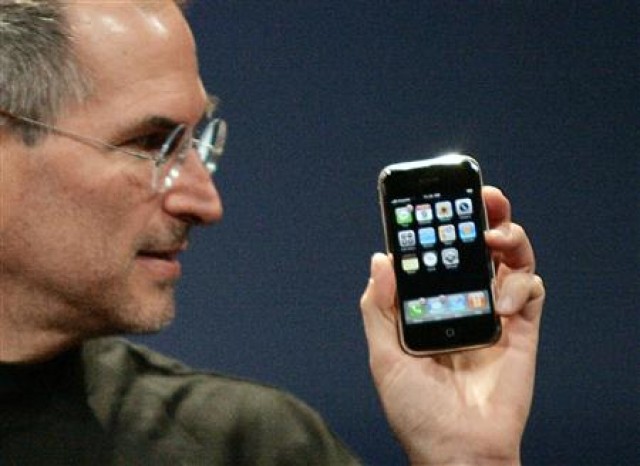Living in a world where the iPhone dominates, and rivals don’t so much compete by doing things differently as by offering cut-rate versions of the same core technology, it can be easy to forget how much of a disruption Apple’s handset actually caused when Steve Jobs unveiled it in 2007.
A new book chronicling the rise and fall of BlackBerry tells the story from the perspective of the one-time king of (semi-)smartphones. And the reaction was every bit as full of shock, awe, anger and denial as you might expect.
Because iPhone and BlackBerry don’t have to compete for customers, right? Right?
You can check out a longer excerpt of the book here and pre-order it here (it comes out tomorrow), but the below passage really sums up what must have been a pretty shockingly bad day for BlackBerry’s founder and vice-chairman Mike Lazaridis:
Lazaridis was home on his treadmill when he saw the televised report about Apple Inc.’s newest product. Research In Motion’s founder soon forgot about exercise that day in January 2007. There was Steve Jobs on a San Francisco stage waving a small glass object, downloading music, videos and maps from the Internet onto a device he called the iPhone.
“How did they do that?” Mr. Lazaridis wondered. His curiosity turned to disbelief when Stanley Sigman, the chief executive of Cingular Wireless joined Mr. Jobs to announce a multiyear contract with Apple to sell iPhones. What was Cingular’s parent AT&T Inc. thinking? “It’s going to collapse the network,” Mr. Lazaridis thought.
The next day Mr. Lazaridis grabbed his co-CEO Jim Balsillie at the office and pulled him in front of a computer.
“Jim, I want you to watch this,” he said, pointing to a webcast of the iPhone unveiling. “They put a full Web browser on that thing. The carriers aren’t letting us put a full browser on our products.”
Mr. Balsillie’s first thought was RIM was losing AT&T as a customer. “Apple’s got a better deal,” Mr. Balsillie said. “We were never allowed that. The U.S. market is going to be tougher.”
“These guys are really, really good,” Mr. Lazaridis replied. “This is different.”
“It’s OK—we’ll be fine,” Mr. Balsillie responded.
RIM’s chiefs didn’t give much additional thought to Apple’s iPhone for months. “It wasn’t a threat to RIM’s core business,” says Mr. Lazaridis’s top lieutenant, Larry Conlee. “It wasn’t secure. It had rapid battery drain and a lousy [digital] keyboard.”
Of course, BlackBerry wasn’t the only company to write off the iPhone as an impressive-but-expensive toy which wouldn’t have too much of an impact on serious handset makers. The most famous is Steve Ballmer’s hysterical laughing at Apple’s $500 phone, which is likely to go down in history along with comments about how The Titanic was an unsinkable ship.
But few companies have suffered as much of a drop as BlackBerry as a result of Apple entering the smartphone business. As the blurb of Losing the Signal: The Untold Story Behind the Extraordinary Rise and Spectacular Fall of BlackBerry points out, in 2009 BlackBerry controlled half of the smartphone market. Today that number is less than one percent.
And with Apple reaching new heights while BlackBerry haemorrhages customers, that figure doesn’t look like it’s turning around any time soon.
Source: WSJ


